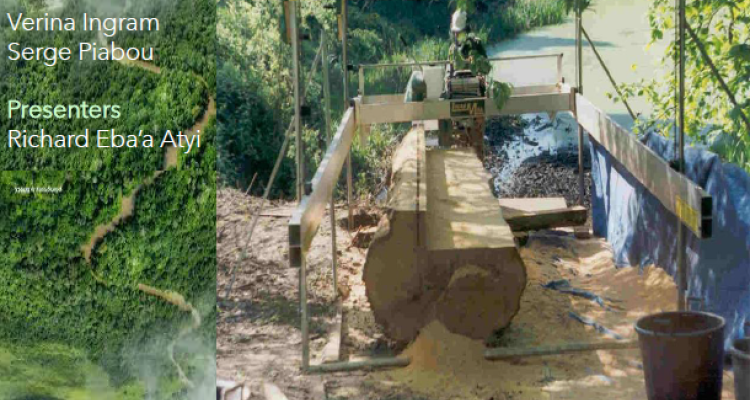
Seminar
Community forestry enterprises in the Congo Basin
A seminar in conjunction with the doctoral defense of Serge Piabuo.
At a seminar organised by Wageningen UR and CIFOR-ICRAF on the morning of 4 April 2024, some 35 researchers gathers online and in Wageningen to share research and critically discuss Community Forests in the Congo Basin. After opening introductions by Dr. Verina Ingram and Serge Piabou (FNP, Wageningen University & Research), Richard Ebba Atyi (CIFOR-IRCAF) gave a rich overview about Community forest management in central Africa, progressandchallenges link. Alphonse Maindo (Tropenbos International) then provided lessons from community forestry enterprises in the Bafwasende landscape, Congo link. Two decades of implementation of community forestry in Cameroon were presented by Fabrice Kengen and Guillaume Lescuyer (CIRAD) with conclusions about the changes in the livelihoods of local populations link. Divine Tita Foundjem (CIFOR-IRCAF) shared an analysis of the state, challenges and opportunities for community forests at the frontiers of cocoa production basins in Cameroon link. The effect of leadership styles on community forest performance and the mediating role of community participation in Cameroon was explored by Joseph Mbane (CIFOR-IRCAF) link and finally, Indra van Gijsbergen (FERN) and Samuel Nguiffo (CED) shared a review of European support in the Congo Basin and how this has brought community forestry to new levels.
The main takeaways from the presentations and discussions were that:
•Community forests are a still growing mode of participatory, decentralised governance & management across the Congo Basin, with examples in Cameroon, Gabon, Republic of Congo and DR Congo
•Experiences between countries have been insufficiently shared, there is mainly a national focus
•The model of Community forests and the community forests enterprise model are ripe for revision after some 25 years of implementation a growing body of evidence on their outcomes and impacts
•positive conservation and livelihood impacts evidenced, but generally low level, and dependent on implementation set up and support
•CFs alone are insufficient to halt deforestation due to commodities such as cocoa
•Need to amplify positive and negative outcomes of CF and CFEs shown by research
•Metrics for measuring impacts and outcomes are very top down, and not from a community perspective
•Community forests still don't address customary tenure, focus on the formal, unaligned with realities of land and resource tenure, rights and access in the Congo Basin
•The political and symbolic functions and roles of community forests are under emphasised
•Empowering competent community leaders is essential to increase the social, economic and environmental performance of community forests
•Gendered aspect of engagement, costs & benefits still under emphasised and under researched
Find below the links to the presentations that were given during the seminar:
1. Leadership & Community Forestry Performance in Cameroon
2. Community forestry in cocoa landscapes
3. Community forestry and social entreprises